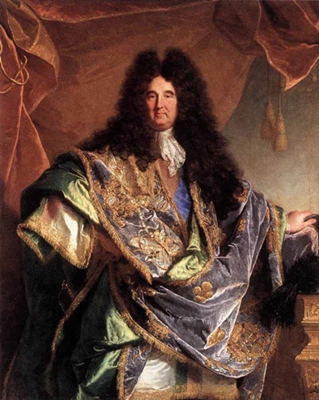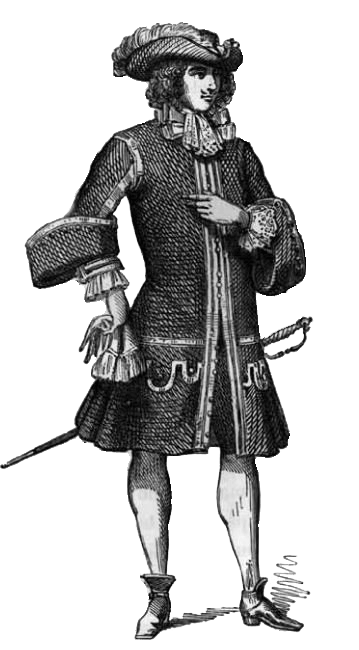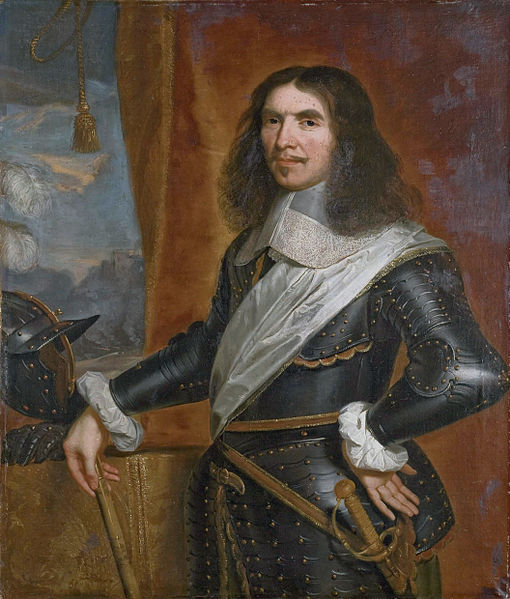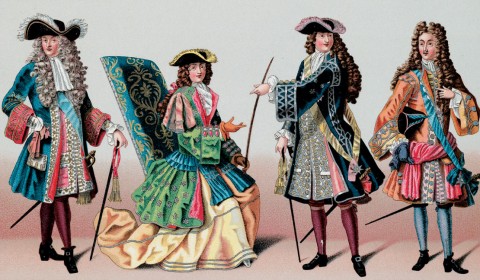Jean-Baptiste Colbert
Born in Reims on 29 August 1619 into a family of wealthy merchants, Jean-Baptiste Colbert’s family claimed to descend from ancient Scottish nobility, something that could never be proved. His father Nicolas Colbert, Sieur de Vandières, acted as merchant and financier and married his cousin Marie Pussort, daughter of a merchant, in 1614. Some years later, in 1629, the couple settled in Paris, where Nicolas started to engage in banking activities, acquired the office receveur général and later acted as partisan, a person who collects taxes on behalf of the Sovereign.
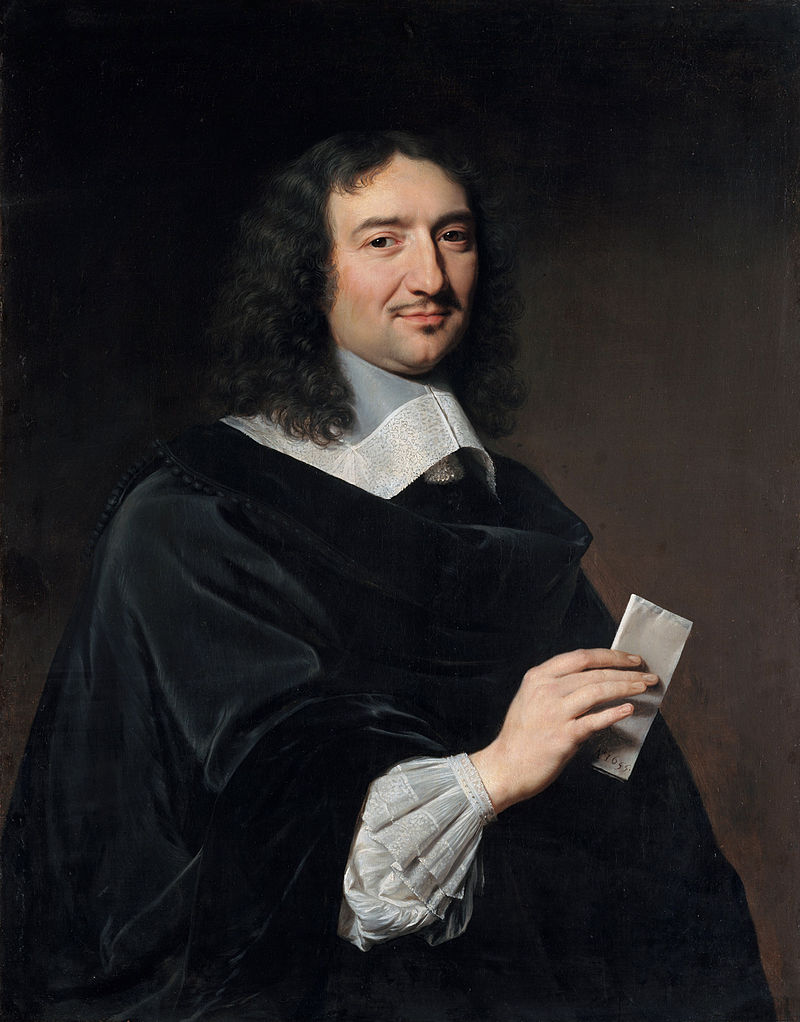
There is not much recorded on Jean-Baptiste Colbert youth. It is believed he spent his early youth at a Jesuit college, afterwards was employed by a banker in Saint-Etienne, later by a Parisian notary and also spent some time in employment of the father of Jean Chapelain, a quite famous poet.
Thanks to family relations, Jean-Baptiste entered into the service of his cousin Jean-Baptiste Colbert de Saint-Pouange, who acted as first clerk in the department of war under Louis XIII. At the age of 21, Jean-Baptiste’s father used those family relations again and, with the help of a bit of money, got Jean-Baptiste the position of ordinary commissioner of war. A part of this new position, required Jean-Baptiste to travel in order to inspect the royal troops, which in turn made him acquire relations to several officers from high-ranking noble families.
In 1645, his cousin Saint-Pouange, who had married a sister of Michel Le Tellier, recommended Jean-Baptise to said Michel Le Tellier and the family relations worked again for Jean-Baptiste. He was employed as private secretary by Michel Le Tellier and promoted to adviser of the King four years later.
Jean-Baptiste must have done his job well. So well Michel Le Tellier in turn recommended him to Cardinal de Mazarin, who then hired Jean-Baptiste to look after his immense fortune. Colbert did so for nearly ten years, also as Mazarin was forced to leave the Kingdom during the Fronde. During this time, Colbert also had a glance at the finances of the Kingdom and how Nicolas Fouquet, the man in charge, dealt with them. Colbert sat down and wrote a summary intended for Mazarin, which pointed out how over half of the collected taxes never entered the royal purse. The Cardinal was rather impressed by it, the court not so much.
Shortly before his death, and seeing how skilled Colbert was in matters of money, Cardinal de Mazarin recommended Jean-Baptiste to the young Louis XIV. The King was not too fond anymore of Fouquet, who got richer and richer, while the royal purse remained empty, and boldly showed his wealth off all the time. Colbert was appointed into the financial council, much to Fouquet’s displeasure, and Jean-Baptiste apparently secured the King’s favour by telling him where Mazarin had hidden some of his wealth after the demise of the Cardinal.
As Fouquet was arrested in September 1661, Louis XIV was so fed up with his surintendant des finances that he decided to take care of money issues himself and without a surintendant des finances. The finance council remained and was to advice the King.
From then one it was one big up for Jean-Baptiste. In 1664 he was appointed Superintendent of Buildings, a very important job under a King that loved to build, and in 1665 he became Controller-General of Finances. Another appointment followed in 1669 as Colbert also became Secretary of State of the Navy. He now exercised power in matters of finances, industry, commerce, navy, police, justice, administrations, public works, positions, agriculture, regional planning and culture. Thus Colbert was in charge most of the activities of the Kingdom, apart from Foreign Affairs and War. The latter business was trusted into the hands of Michel Le Tellier and after him into those of his son Francois Michel Le Tellier aka Louvois.

Le Grand Colbert is a quite fitting nickname for the person who controlled most of the Kingdom. Madame de Sévigné gave him a bit more cheeky nickname, she called him Le Nord. Partly due to his ruthless reputation. Colbert reformed the tax system, a system in which the poor paid the most and the nobles almost nothing, and began to fill the royal purse to bursting. He also got to the nobles by not raising the direct taxes the poor had to carry, but raising the indirect ones the nobility had to pay as well. New industries were established, the system of tax collecting improved, debts paid and French goods advertised in foreign markets. To make sure those met a certain quality, Colbert also came up with regulations for the fabrication and if those were not met, the goods were destroyed. The fabricator could even go to the pillory for it.
Jean-Baptiste Colbert also acted as advocate of the arts and, loving literature, possessed a impressive private library. Colbert founded the Academy of Inscriptions and Medals in 1663, its mission was to compose or obtain Latin inscriptions to be written on public monuments and medals issued to celebrate the events of Louis XIV’s reign. He founded the Academy of Sciences, to encourage and protect the spirit of French scientific research, in 1666. The French Academy in Rome in 1666. The Paris Observatory, foremost astronomical observatory of France, in 1667. The Royal Academy of Architecture, influencing architectural theory and education, in 1671. Colbert also got involved with the Academy of Painting and Sculpture, which was founded by Mazarin, and tried to improve the prestige of France and its royal family by hiring the best artists he could find. As a true protector of the arts, Colbert also made the life of poets and playwrights easier by granting them a pension, this included even foreign writers.
Although Colbert always did his best to enhance the prestige of his King, he was not fond of Louis XIV’s undertaking number one to gain prestige, the chateau de Versailles. Colbert was of the opinion that instead of wasting money on the hunting lodge, the King should rather renovate and enlarge the Louvre. He told Louis XIV regularly what a waste of money Versailles is.
In matters of commerce, Colbert established the French East India Company, the Company of the West Indies, and the Levant Company.
But not everything was sunshine in Colbert’s life. Towards the end of it, he made an enemy of Louvois who then managed to make Colbert lose favour. Jean-Baptiste, being not fond of wasting money at all, always urged and reminded the King to spend less of it, while Louvois took the opposite direction and flattered the King and his extravagances. Louis XIV got annoyed by Colbert’s reproaching and Louvois took advantage of it.
Jean-Baptiste nevertheless continued his work although Louvois did his best to oppose him. Constant stomach ache was the cause of much suffering in his later life and only allowed him to consume liquids or moist bread.
Le Grand Colbert died aged sixty-four and bedridden on September 6 in 1683. By then Louvois had managed to discredit Colbert so much, his coffin had to be protected by guards to keep the mob away from tearing his corpse into pieces.
